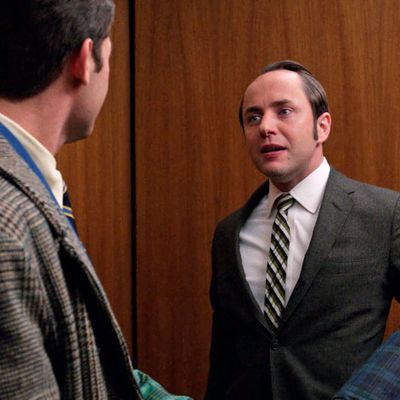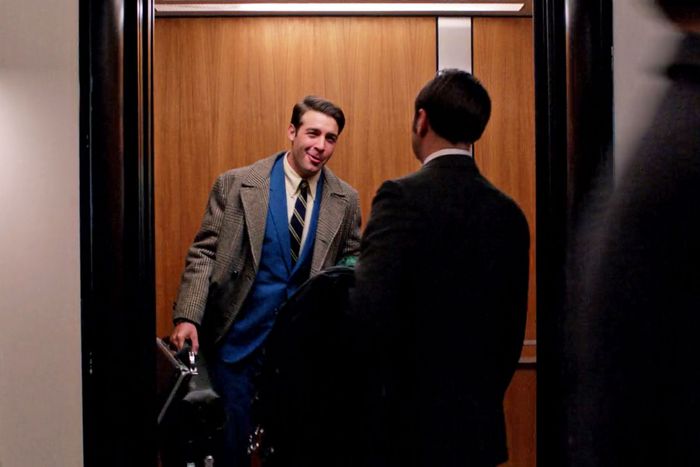
Mad Men was a show about people who make a living by selling succinct, memorable catchphrases in the name of capitalism, so it tracks that the AMC prestige drama generated its fair share of memorable quotes and memes, from Don Draper’s “That’s what the money is for” to Peggy Olson’s “deal with it” hallway strut. But in the GIF-saturated confines of the internet, perhaps no Mad Men moment has had the stickiness of a simple three-syllable phrase uttered by Pete Campbell, Vincent Kartheiser’s walking punch line of an ad executive, in the show’s season-six finale, “In Care Of.”
The line’s endurance in the six years since it was first uttered rests in its malleability: Someone asks how you’re feeling when you have a cold? “Not great, Bob.” Boss wants to know how that project’s coming? “Not great, Bob.” Thoughts on the current political climate? “Not great, Bob.”
The irony of the seemingly universal application of “Not great, Bob” today is that it arose from such a specific moment in “In Care Of.” It’s uttered by Pete when he unexpectedly encounters Bob Benson, James Wolk’s unassuming Machiavellian ladder climber, in an elevator just after learning that his mother mysteriously toppled off a cruise ship while on a vacation she’d taken with her male nurse turned spouse — whom Bob himself had recommended. But when deployed in reaction-GIF form, “Not great, Bob” works just as well as a comedic rejoinder without any of that context. Such is its strange power.
So just how did this pop-culture jewel come to be before it became part of the Zeitgeist? We asked the writers and actors behind the elevator confrontation that will live on in pixelated infamy.
“Mad Men never gets quite as much credit as it should for being really funny.”
Carly Wray, who was the writers’ assistant for Mad Men that season, says that credit for coming up with the line goes to her boss, series creator Matt Weiner (who also directed the episode). However, she says she can “take credit for leaving it in the script.”
The duo co-wrote the episode late at night after spending the day together with the other staffers in the writers room. He would dictate dialogue to her as she typed, revising and re-pitching lines as they went.
“He said that line as a response [for Pete to say to Bob] and wasn’t pitching it as a joke, but because I was punchy and it was the middle of the night, I laughed,” she says. “It had this thing of, Is no one else going to find this funny? If it’s not 2 o’clock in the morning and you’re not exhausted, is it not going to be funny?”
This was often the reason jokes played so well in Mad Men scripts: They were unexpected on a show that covered alcoholism and other addictions, depression, rape, and institutionalized bigotry and sexism. But, says Wray, “Mad Men, I feel like, never gets quite as much credit as it should for being really funny.”
However, both writers say they didn’t really know how well “Not great, Bob” would work until they got to filming.
“He had such a head of steam”
Weiner says that, while directing the episode, he and cinematographer Chris Manley wanted to play up the absurdity of Pete’s predicament of processing his mother’s most likely demise but still needing to attend to his pressing business meetings. He says they “had the idea of keeping the energy going” after Pete’s secretary first gets the telegram of these troubles earlier in the episode to eventually “having this great, dynamic shot of pulling back at the entrance [of the agency], which reveals that Bob is already waiting in the elevator.”
“Of course they’re going to see each other [because they’re both working on the GM account] … let’s just have them in the elevator and get it over with,” Weiner says, adding that both Pete the character and Kartheiser the actor “had such a head of steam that for him to have to see Bob and for Bob to be like, ‘What are you talking about?’ … Vincent killed it.”
Kartheiser is more humble, saying he’s not the type of actor who always immediately knows how he’s going to play a scene when he gets a script. “Although [my process] does have a history of me fleshing it out on my own before I get to set,” he says a scene “doesn’t become concrete” until he “sees how the cameras are set up and how he can react to the other actors.” He says the scene itself “was pretty easy to do because we had enough setup for it in previous shots” and he understood his character’s motivation.
“The way I remember the scene, even though we were in an elevator, I didn’t get in his face,” Kartheiser reflects. “I didn’t back off from him, but it wasn’t like I was dressing him down so much as I was expressing my anger toward him. It wasn’t so much me being the aggressor as me being reactionary to the outlandish situation that he had helped create.”
Wolk also didn’t think too much ahead of time about how he would deliver the otherwise innocuous setup question of “How are you?” Rather, Wolk says that he tended to think more about his character’s relationship to the other person. Plus, “Bob was written in a way that it led me to play it a little psychotic … he was a little too cheerful at times.”
Perhaps because Wolk was in character, he didn’t realize in the moment of filming that he was the straight man setting up to make comedy gold — although he admits that there was laughter behind the scenes, and that he did break during one of the takes.
“We said a lot of things in the elevator”
It’s noteworthy that this scene takes place in the tight quarters of the advertising agency’s elevators, as they were routinely used for the more emotional, heated conversations that could be had outside the purview of polite company. And while jokes that rely on the timing of an elevator’s doors opening and closing date back at least as far as The Bob Newhart Show, Weiner says he’s proud of how well this moment plays out — a quick scene that’s funny for us and embarrassing and awkward for Pete.
“We said a lot of things in the elevator because it’s a great way to get people together who would not normally be together,” Weiner says, adding that it was also a frugal move, since they didn’t have to build a new set. “By the end of season six, we were continuing to exploit any kind of joke that could possibly be done [in the elevator], with the exception of someone getting their tie caught in the door.”
Neither of the actors were particularly bothered by the close space, with Kartheiser pointing out that his character had several up-close-and-personal encounters in elevators throughout Mad Men’s seven-season run.
“I don’t know if the closeness affected it too much; there wasn’t a feeling of claustrophobia or anything,” he says. “In those kinds of moments where you’re confronted by somebody who you feel betrayed you, or who you feel you have some sort of beef with, the overlying feeling kind of takes precedence over all those little nuances.”
As for a fear of over-enunciating those three famous words? “Oh God, I hope I didn’t spit,” Kartheiser says sheepishly.
Bobbing Up in Pop Culture
It’s impossible to definitively quantify “Not great, Bob” as the quintessential Mad Men quote for the internet age, particularly with so many other worthy contenders to the title. (Here’s looking at you, Joan telling Peggy, “I want to burn this place down” — in an elevator, no less!) But Tyler Menzel, the head of content and editorial for GIF repository site GIPHY, speculates that the reason the moment has continued to resonate online is because “one of the true powers of the GIF is its ability to amplify emotion.”
“Pete Campbell is nothing but emotion: bluster and frustration … It’s the perfect style of GIF to Slack to a co-worker or text to a friend,” Menzel says.
But the line also maintains its relevance IRL, particularly for those who had a hand in creating it and still find it echoing back at them years later.
Weiner and Wray both say that they have received social-media messages from someone bearing a “Not great, Bob” tattoo. (More recently, Wray has had this happen with her prose for HBO’s Westworld. So apparently that’s her thing.) Wolk says he recently asked a friend what it was like inside a beachfront public bathroom, and he immediately got a certain three-word response. Kartheiser says he was particularly pleased to see “Not Great, Bob” as a Jeopardy! category when Weiner competed on the game show as a celebrity contestant, and that when he and his wife, actress Alexis Bledel, first moved in together, they would use the phrase as answers to questions like “How’s dinner coming?”
Despite the fact that Kartheiser says he actually doesn’t enjoy watching himself onscreen, he seems to have reached a sort of acceptance about his place in internet history. His answer when I asked how he was doing when we started our interview? A deadpan “Not great, Whitney.”


